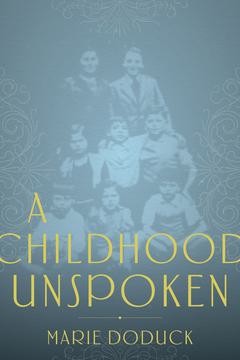A Childhood Unspoken
I was on a farm, I think — I’m not sure which one; the child Mariette didn’t organize time like we do, and I never learned names or faces — and it was my birthday, and the woman I was living with took me back into the city, into Brussels, so that I could celebrate my birthday with my mother. I hadn’t been home for a long time, so I was excited to see Maman. I remember walking with this woman down the street, and in the distance I could see my mother, and with her was my brother Albert. And I remember thinking how beautiful she was, all dressed up to celebrate. I could see her hair, and how carefully she had done it, in waves. I was so happy to see her again, and I thought how lucky I was to be able to spend my birthday with my mother and that this was the best present I could have been given. Suddenly, the woman I was walking with took hold of me roughly and covered my mouth, just as I was going to call Maman, to stop me from yelling. A truck had driven up to where my mother and brother were and stopped. Germans flooded out and grabbed my mother and brother and put them in the truck. Just like that. I never saw them again.
Since then, I have refused to celebrate my birthday, which is on May 10. For many years, I didn’t explain to my husband or children why. I would just say that it was close to Mother’s Day and Mother’s Day was enough. How do you share such a painful memory? How do you say, as a grown woman, that the child in you relives that memory each year on her birthday, and how can you celebrate anything while reliving such a painful event?
For many, many decades I thought I had seen my mother being taken away in 1942, around my seventh birthday. Very recently I learned that this happened in 1943. Documents in the Belgian archives list my mother’s arrest date, along with Albert’s, as May 27, 1943. So I surmise that I was returning home to celebrate my eighth birthday, not my seventh birthday, as I remembered. This detail may seem minor, but it is incredibly important to me, and it was also an enormously relieving discovery. For so long I had lived with this memory inside me but could not say for sure that was how it had happened. To find out that your memory, your truth, is also real…that is a feeling I cannot easily describe.
A Childhood Unspoken, Marie Doduck
Mariette is only five years old when the Nazis invade her hometown of Brussels, Belgium, in 1940. Soon her family is torn apart, and Mariette and her siblings are scattered across the city and countryside, hiding with non-Jews and in convents and orphanages or working for the resistance. Seeing violence and death all around her, Mariette learns the skills she needs to survive — how to throw a knife, jump from a moving vehicle and, most importantly, stay silent. Mariette emerges from the war quick-thinking, fiercely independent and ready to start a new life in Canada. As she navigates a transition to a new identity as Marie — an industrious and resourceful community member, mother and advocate for children’s rights — Mariette, the silent child, begins to find her voice.
Introduction by Lauren Faulkner Rossi
- At a Glance
- Belgium
- Hiding
- War Orphans Project
- Arrived in Canada in 1947
- Adjusting to life in Canada
- Accessible ebook
- Educational materials available Seeking Refuge
- Marie Doduck
216 pages, including index
Western Canada Jewish Book Award for Holocaust Literature 2025
About the author

Marie (Mariette) Rozen Doduck was born in Brussels, Belgium, in 1935. She immigrated to Canada in 1947 as a war orphan with three of her siblings and settled in Vancouver. In 1955, she married her husband, Sidney, and raised three children. Marie is actively involved in Holocaust education and is a cofounder of the Vancouver Holocaust Education Centre. She has received awards for her community leadership work and activism, and in 2024, she was honoured with the Order of Canada.
Free Books and Educational Materials
We help teachers bring the subject of the Holocaust into their classrooms, using first-person narratives as a way for students to connect with the history of the Holocaust through survivors’ experiences. Our Holocaust survivor memoirs, educational resources and programming are free of charge in Canada and available in both French and English.


